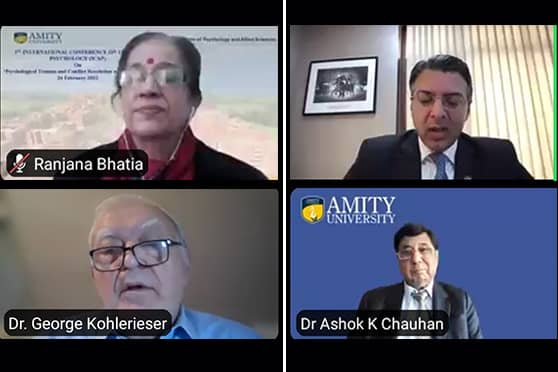Amity University hosts conference on Applied Psychology to tackle trauma and conflict


Experts discussed the relationship between conflict resolution and psychological trauma at the First International Conference on Applied Psychology, organised by the Amity Institute of Psychology and Allied Sciences (AIPAS) at Amity University, Noida. The theme of the virtual event was ‘Psychological Trauma and Conflict Resolution in Present Times’.
Richard Mollica, director of the Harvard Program in Refugee Trauma (HPRT) of Massachusetts General Hospital and Harvard Medical School, was a keynote speaker at the conference and said, “Every human being experiences tragedies in their lifetime. Traumatic incidents like losing a family member, losing a job and financial difficulties have increased during the pandemic, which has adversely impacted the mental health of a huge population of the world. We must take our mental health seriously and never neglect it as it affects our overall well-being. Discussing problems with a counsellor or a psychiatrist is very helpful in coming out of traumatic experiences as it requires scientific emotional healing.”
Elaborating on the motivational theory ‘Maslow’s Hierarchy of Needs’, Mollica said, “It is a theory in Psychology comprising a five-tier model of human needs, depicted as hierarchical levels within a pyramid. From the bottom of the hierarchy upwards, the needs are: physiological (food and clothing), safety (job security), love and belonging needs (friendship), esteem, and self-actualisation.”
He also discussed the ‘New H5 Model’ that addressed the trauma suffered by refugees and the mental and physical issues caused by it. Understanding the impact of the trauma leads to comprehensive refugee care. The acclaimed model addresses the risk and vulnerability affecting highly traumatised patients and communities.
Gerard Fromm, senior consultant, Erikson Institute for Education and Research at the Austen Riggs Centre, Massachusetts, was the guest of honour at the virtual conference. He said, “The transmission of trauma could be seen as sharing trauma with others in the hope that sharing pain will make it more bearable. Treating trauma involves helping a person to let go of defences against pain and open themselves to disturbing thoughts and feelings.”
Fromm also elaborated on the ‘International Dialogue Initiative’ which is a private, international, multidisciplinary group of psychoanalysts, academics, diplomats and other professionals, founded by Vamik Volkan in 2007. The group’s mission is to bring psychological understanding to societal conflict.
George Kohlerieser, a professor of Leadership and Organisational Behaviour at the International Institute for Management Development (IMD) Business School, Switzerland, said, “Every person needs to deal with grief by awareness, acceptance and action. Many myths are prevalent about grief in our society such as grieving is best done alone; tears are signs of weakness; there is a specific timeline to stop grieving; and many others.”
He also explained the various stages of grief — charge, tension, discharge, relaxation and flexibility, and emphasised the importance of sharing one’s thoughts with others and expressing their emotions as most people shy away from doing so.”
Ranjana Bhatia, head of Amity Institute of Psychology and Allied Sciences, delivered the welcome address, saying, “The last two years have brought forward many different kinds of experiences for people that have led to psychological trauma for many individuals. People have shared in the clinical room extreme alienation and panic and also where they used resilience to overcome overwhelming odds. With this conference, we aim to promote and evaluate the field of Psychology and Conflict Resolution in present times and spread awareness about mental health.”
Papers on topics like trans-generational trauma in therapeutic practice and strategies to cope with loss and grief and collective trauma as a consequence of the pandemic were presented during the conference.